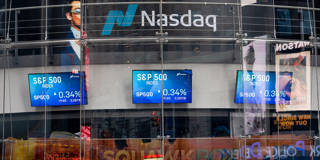Ever since COVID-19 collided with the enormous bubble governments have been using to re-float the financial sector since 2008, booming equity markets became compatible with wholesale economic implosion. That became clear on August 12 in London and New York.
ATHENS – On August 12, something extraordinary happened. The news broke that, in the first seven months of 2020, the United Kingdom’s economy had suffered its largest contraction ever (a drop in national income exceeding 20%). The London Stock Exchange reacted with a rise in the FTSE 100 by more than 2%. On the same day, when the United States was beginning to resemble a failed state, not merely a troubled economy, the S&P 500 hit a record high.
To be sure, financial markets have long rewarded misery-enhancing outcomes. Bad news for a firm’s workers – planned layoffs, for example – is often good news for its shareholders. But when the bad news engulfed most workers simultaneously, equity markets always fell, owing to the reasonable expectation that, as the population tightened its belt, all income, and thus average profits and dividends, would be squeezed. The logic of capitalism was not pretty, but it was comprehensible.
Not anymore. There is no capitalist logic to the developments that culminated on August 12. For the first time, a widespread expectation of diminished revenues and profits led to – or at least did not impede – a sustained buying frenzy in London and New York. And this is not because speculators are betting that the UK or the US economies have hit bottom, making this a great time to buy shares.

ATHENS – On August 12, something extraordinary happened. The news broke that, in the first seven months of 2020, the United Kingdom’s economy had suffered its largest contraction ever (a drop in national income exceeding 20%). The London Stock Exchange reacted with a rise in the FTSE 100 by more than 2%. On the same day, when the United States was beginning to resemble a failed state, not merely a troubled economy, the S&P 500 hit a record high.
To be sure, financial markets have long rewarded misery-enhancing outcomes. Bad news for a firm’s workers – planned layoffs, for example – is often good news for its shareholders. But when the bad news engulfed most workers simultaneously, equity markets always fell, owing to the reasonable expectation that, as the population tightened its belt, all income, and thus average profits and dividends, would be squeezed. The logic of capitalism was not pretty, but it was comprehensible.
Not anymore. There is no capitalist logic to the developments that culminated on August 12. For the first time, a widespread expectation of diminished revenues and profits led to – or at least did not impede – a sustained buying frenzy in London and New York. And this is not because speculators are betting that the UK or the US economies have hit bottom, making this a great time to buy shares.